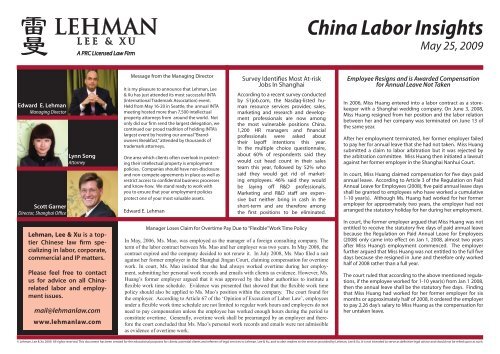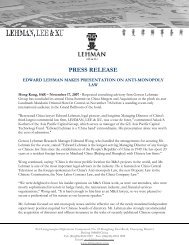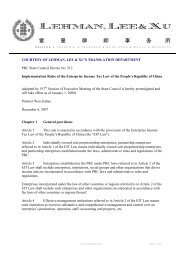Labor Newsletter Template.indd - Lehman, Lee & Xu
Labor Newsletter Template.indd - Lehman, Lee & Xu
Labor Newsletter Template.indd - Lehman, Lee & Xu
Create successful ePaper yourself
Turn your PDF publications into a flip-book with our unique Google optimized e-Paper software.
雷曼LEHMANLEE E & XUA PRC Licensed Law FirmChina <strong>Labor</strong> InsightsMay 25, 2009Edward E. <strong>Lehman</strong>Managing DirectorMatthew Scott Garner McKeeDirector, Foreign Legal Shanghai Consultant OfficeScott Lynn Song GarnerDirector, AttorneyShanghai Office<strong>Lehman</strong>, <strong>Lee</strong> & <strong>Xu</strong> is a toptierChinese law firm specializingin labor, corporate,commercial and IP matters.Please feel free to contactus for advice on all Chinarelatedlabor and employmentissues.mail@lehmanlaw.comwww.lehmanlaw.comMessage from the Managing DirectorIt is my pleasure to announce that <strong>Lehman</strong>, <strong>Lee</strong>& <strong>Xu</strong> has just attended its most successful INTA(International Trademark Association) event.Held from May 16-20 in Seattle, the annual INTAmeeting hosted more than 7,500 intellectualproperty attorneys from around the world. Notonly did our firm send the largest delegation, wecontinued our proud tradition of holding INTA’slargest event by hosting our annual “BrandownersBreakfast,” attended by thousands oftrademark attorneys.One area which clients often overlook in protectingtheir intellectual property is employmentpolicies. Companies should have non-disclosureand non-compete agreements in place as well asrestrict access to confidential business processesand know-how. We stand ready to work withyou to ensure that your employment policiesprotect one of your most valuable assets.Edward E. <strong>Lehman</strong>Survey Identifies Most At-riskJobs In ShanghaiAccording to a recent survey conductedby 51job.com, the Nasdaq-listed humanresource services provider, sales,marketing and research and developmentprofessionals are now amongthe most vulnerable positions China.1,200 HR managers and financialprofessionals were asked abouttheir layoff intentions this year.In the multiple choice questionnaire,about 60% of respondents said theywould cut head count in their salesteam this year, followed by 52% whosaid they would get rid of marketingemployees. 46% said they wouldbe laying off R&D professionals.Marketing and R&D staff are expensivebut neither bring in cash in theshort-term and are therefore amongthe first positions to be eliminated.Manager Loses Claim for Overtime Pay Due to “Flexible” Work Time PolicyIn May, 2006, Ms. Mao, was employed as the manager of a foreign consulting company. Theterm of the labor contract between Ms. Mao and her employer was two years. In May 2008, thecontract expired and the company decided to not renew it. In July 2008, Ms. Mao filed a suitagainst her former employer in the Shanghai Jingan Court, claiming compensation for overtimework. In court, Ms. Mao insisted that she had always worked overtime during her employment,submitting her personal work records and emails with clients as evidence. However, Ms.Huang’s former employer argued that it was approved by the labor authorities to institute aflexible work time schedule. Evidence was presented that showed that the flexible work timepolicy should also be applied to Ms. Mao’s position within the company. The court found forthe employer. According to Article 67 of the ‘Opinion of Execution of <strong>Labor</strong> Law’, employeesunder a flexible work time schedule are not limited to regular work hours and employers do notneed to pay compensation unless the employee has worked enough hours during the period toconstitute overtime. Generally, overtime work shall be prearranged by an employer and thereforethe court concluded that Ms. Mao’s personal work records and emails were not admissibleas evidence of overtime work.Employee Resigns and is Awarded Compensationfor Annual Leave Not TakenIn 2006, Miss Huang entered into a labor contract as a storekeeperwith a Shanghai wedding company. On June 3, 2008,Miss Huang resigned from her position and the labor relationbetween her and her company was terminated on June 13 ofthe same year.After her employment terminated, her former employer failedto pay her for annual leave that she had not taken. Miss Huangsubmitted a claim to labor arbitration but it was rejected bythe arbitration committee. Miss Huang then initiated a lawsuitagainst her former employer in the Shanghai Nanhui Court.In court, Miss Huang claimed compensation for five days paidannual leave. According to Article 3 of the Regulation on PaidAnnual Leave for Employees (2008), five paid annual leave daysshall be granted to employees who have worked a cumulative1-10 year(s). Although Ms. Huang had worked for her formeremployer for approximately two years, the employer had notarranged the statutory holiday for her during her employment.In court, the former employer argued that Miss Huang was notentitled to receive the statutory five days of paid annual leavebecause the Regulation on Paid Annual Leave for Employees(2008) only came into effect on Jan 1, 2008, almost two yearsafter Miss Huang’s employment commenced. The employerfurther argued that Miss Huang was not entitled to the full fivedays because she resigned in June and therefore only workedhalf of 2008 rather than a full year.The court ruled that according to the above mentioned regulations,if the employee worked for 1-10 year(s) from Jan 1 2008,then the annual leave shall be the statutory five days. Findingthat Miss Huang had worked for her former employer for sixmonths or approximately half of 2008, it ordered the employerto pay 2.26 day’s salary to Miss Huang as the compensation forher untaken leave.© <strong>Lehman</strong>, <strong>Lee</strong> & <strong>Xu</strong> 2009. All rights reserved. This document has been created for the educational purposes for clients, potential clients and referrers of legal services to <strong>Lehman</strong>, <strong>Lee</strong> & <strong>Xu</strong>, and to alert readers to the services provided by <strong>Lehman</strong>, <strong>Lee</strong> & <strong>Xu</strong>. It is not intended to serve as definitive legal advice and should not be relied upon as such.
May <strong>Labor</strong> Briefing:Case AnalysisChina <strong>Labor</strong> InsightsMay 25, 2009In December 2008, Mr. Wang, sales manager with a foreign invested company, received by express mail a “Notice of Revocation of <strong>Labor</strong> Contract” from his employer.The notice stated that Mr. Wang had quarreled with one of the employer’s clients and had failed to make secure a sale to the client. The employer consideredMr. Wang’s behavior to have brought about a great loss to the company and that his actions had constituted a material breach of the company’s rules and regulations.Mr. Wang did not consider his actions to have breached the company’s rules and regulations and submitted a request for labor arbitration with the local labor disputearbitration committee, requesting double financial compensation based on article 87 of Chinese <strong>Labor</strong> Contract Law. Article 87 provides that if an employer revokesor terminates a labor contract in violation of the <strong>Labor</strong> Contract Law, it shall pay to the employee double compensation.However, according to Article 39, an employer may terminate the labor contract if the employee materially breaches the employer’s rules. Therefore, if the employercould prove that the employee’s actions constituted a material breach of the employer’s rules, the employer would not be required to pay the double severance.According to “Interpretation of the Supreme People’s Court on Several Issues Regarding the Application of Laws for theTrial of <strong>Labor</strong> Dispute Scott Cases”, Garner where disputes arise regarding dismissal or termination of the labor contract, theemployer bears the Director, burden Shanghai of prving Office all elements of the claim. Therefore, in this case, the employer was required to prove:1. Mr. Wang had quarreled with the employer’s client during negotiation;2. There is a causal relationship between Mr. Wang’s quarrel with clientand the company’s failure to secure an agreement with client;3. The failure to secure an agreement with client brought about great economicForeign Legal loss Consultant to the company;Matthew McKee4. The situation discussed above was clearly set forth in the company’srules and regulations as a behavior constituting a material breach of thoserules and regulations.5. The rules and regulations were legally validIn this case, it was centrally important for the company to provide evidenceto the labor arbitration tribunal showing that Mr. Wang’s behavior constituteda material breach of the company’s rules and regulations and that thecompany had the right to terminate the labor contract immediately. If thecompany failed to prove all of the facts discussed above, then the companywould be required to pay double compensation under the <strong>Labor</strong> ContractLaw. However, if the employer could prove all of the facts above, it couldavoid paying a severance altogether.Material BreachPage 2 of each edition of China<strong>Labor</strong> Insights is dedicated to abriefing on a particular aspect ofChinese employment law.There is a high risk to terminating a labor contract based on a material breachof the rules and regulations. Employers bear the burden of proof and shouldpay special attention that they have sufficient and clear evidence showingthat an employee breached the employers rules and regulations. Furthermore,the rules and regulations must be legally valid under Chinese law andapproved by either the employee’s representative congress or all of the employeesbefore they will bind the employees.<strong>Lehman</strong>, <strong>Lee</strong> & <strong>Xu</strong>’s corporate and international taxation team, in association with <strong>Lehman</strong>Tax & Accounting, offers clients unrivalled and comprehensive services relating to bothChinese and international taxation matters, and provides a high standard of technical expertisewith a practical and commercial approach.For more information, please visit: <strong>Lehman</strong>, <strong>Lee</strong> & <strong>Xu</strong> — www.lehmanlaw.com<strong>Lehman</strong> Tax & Accounting — www.lehman.com.cnPage 2© <strong>Lehman</strong>, <strong>Lee</strong> & <strong>Xu</strong> 2009. All rights reserved. This document has been created for the educational purposes for clients, potential clients and referrers of legal services to<strong>Lehman</strong>, <strong>Lee</strong> & <strong>Xu</strong>, and to alert readers to the services provided by <strong>Lehman</strong>, <strong>Lee</strong> & <strong>Xu</strong>. It is not intended to serve as definitive legal advice and should not be relied upon as such.





